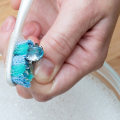Natural stone countertops are a timeless addition to any Natural stone countertops are a timeless addition to any Kitchen Remodel in Isle of Palms SC. But that beauty comes with regular maintenance, such as sealing, to protect it from wear and tear. Marble, limestone and granite countertops must be sealed because they are naturally porous. If not sealed, they could easily be subject to damage and deterioration of the material. Quartz is a type of stone, but it's not the same as quartz countertops. Natural stone countertops are a timeless addition to any Kitchen Remodel in Isle of Palms SC. But that beauty comes with regular maintenance, such as sealing, to protect it from wear and tear. Marble, limestone and granite countertops must be sealed because they are naturally porous. If not sealed, they could easily be subject to damage and deterioration of the material. Quartz is a type of stone, but it's not the same as quartz countertops.
Quartz countertops don't need to be sealed because they are engineered with resins that make them non-porous. However, granite countertops are still very popular and require sealing to protect them from wear and tear. Before you start your countertop project, it's important to know which materials need to be sealed and when they need to be re-sealed (usually every 5 to 7 years, depending on the sealer). There's a simple test you can do to determine if your countertop needs to be sealed.
Marble is one of the most luxurious countertop materials available, but it requires regular sealing to ensure its longevity. Limestone and granite countertops must also be sealed because they are naturally porous. If not sealed, they could easily be subject to wear and tear on the material. Quartz countertops don't need to be sealed because they are engineered with resins that make them non-porous. However, if you try to seal a granite countertop that doesn't need it or reseal a countertop too often, a buildup will build up that will make it dull and scratchy. When choosing a countertop material for your kitchen or bathroom, there are many details to consider, from cost to durability to appearance.
Knowing which materials need sealing and when they need re-sealing is an important part of the decision-making process.



